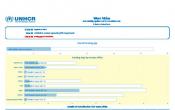Côte d'Ivoire
Operation: Côte d'Ivoire
Location
{"longitude":-6,"latitude":8,"zoom_level":7}
Latest update of camps and office locations 21 Nov 2016. By clicking on the icons on the map, additional information is displayed.
Key Figures
| 2017 planning figures | |
| 11,000 | returnees will receive a Voluntary Repatriation package and safe transportation |
| 10,000 | individuals at risk of statelessness will be assisted for acquisition or confirmation of nationality |
| 3,674 | people with specific needs among refugees and returnees will receive cash grants |
| 3,000 | returnees will receive production kits in agriculture, livestock or fisheries |
| 2,000 | individuals at risk of statelessness will receive civil status documentation by national institutions |
| 2015 end-year results | |
| 1,114 | Ivoirian refugees, mainly from Liberia, were voluntary repatriated in 2015, when the facilitated voluntary repatriation resumed in December 2015 |
| 60 | reintegration monitoring committees were established by UNHCR to monitor the smooth reintegration of returnees into their communities, as part of the facilitated voluntary repatriation |
| 2,700 | refugees were assisted with civil status registration or documentation, and 60 refugee children were registered and received birth certificates |
| 180 | refugees with specific needs received support through cash grants, while 400 others were provided non-cash support |
People of Concern
39%
Increase in
2015
2015
| 2015 | 1,023,579 |
| 2014 | 739,014 |
| 2013 | 768,747 |

[["Refugees",1980],["Asylum-seekers",649],["IDPs",308272],["Returned IDPs",399],["Returned refugees",12222],["Stateless",700000],["Others of concern",57]]
Loading ...
Budgets and Expenditure for Côte d'Ivoire
< Back
2015
{"categories":[2012,2013,2014,2015,2016,2017],"budget":[31.3468103,27.8455643,27.245166635,26.54975356,30.78501955,20.258448353],"expenditure":[15.6773924,15.61798496,13.36914223,9.28496264,null,null]}
{"categories":[2012,2013,2014,2015,2016,2017],"p1":[9.59559037,20.02234024,15.644387895,15.03323275,5.52360042,3.05136175],"p2":[3.74846231,1.80919191,2.71130599,3.59930438,3.99044151,4.17488095],"p3":[4.9974249,4.63222311,8.88947275,7.91721643,21.27097762,13.032205653],"p4":[13.00533272,1.38180904,null,null,null,null]}
{"categories":[2012,2013,2014,2015,2016,2017],"p1":[6.85763987,11.52592771,7.72297774,4.70827247,null,null],"p2":[0.92728303,1.18513842,1.48255059,2.07055165,null,null],"p3":[3.39451924,2.08293505,4.1636139,2.50613852,null,null],"p4":[4.49795026,0.82398378,null,null,null,null]}
Loading ...
CHOOSE A YEAR
- 2014
- 2015
- 2016
- 2017
Working environment
Côte d'Ivoire is gradually emerging from 2010-2011 political crisis and consolidating its gains. More efforts are required in some important areas, including transitional justice, strengthening social cohesion, and security sector reforms. The Government plays its role in facilitating work with communities for sustainable reintegration, including reintegration of children into the education system, and facilitating access to basic services, property and land.Côte d’Ivoire hosts the largest population at risk of statelessness in West Africa. UNHCR is supporting the Government in reduction of statelessness under the special declaration law and prevention of statelessness through issuance of late birth certificates by mobile courts.
Côte d’Ivoire has a generous open door policy for refugees and asylum-seekers. UNHCR is working with the Government for adoption of the draft National Asylum Law to strengthen the national legal framework and to domesticate the international instruments in order to address the protection needs of refugees and asylum-seekers.
Key priorities
In 2017, UNHCR’s operation will focus on:• Reception and smooth reintegration of returning Ivorian refugees, together with the Government and development actors. Under the durable solution strategy for Ivorian returnees, UNHCR Côte d’Ivoire expects to receive around 11,000 people from among remaining Ivorian refugees in neighbouring countries under its voluntary repatriation programme. Returnees will receive a repatriation package on arrival and targeted assistance through reintegration and reconciliation activities;
• Prevention and reduction of statelessness will remain a high priority in 2017, and the Office will redouble its efforts to implement statelessness strategy for reduction and prevention of statelessness in the country;
• Provision of protection and assistance to refugees and asylum seekers in the country. The refugee protection strategy will focus on the search for durable solutions (repatriation, reintegration, and resettlement). The Government will continue refugee status determination through eligibility and appeal committees. UNHCR will advocate the adoption of the draft revised law on asylum, and will strive for the protection of refugees.

